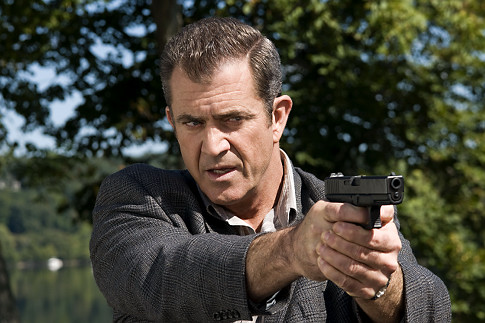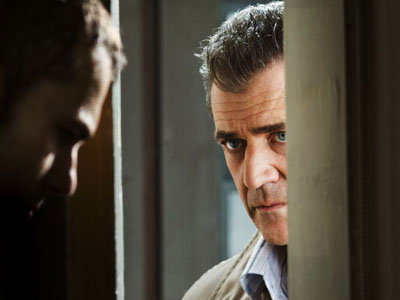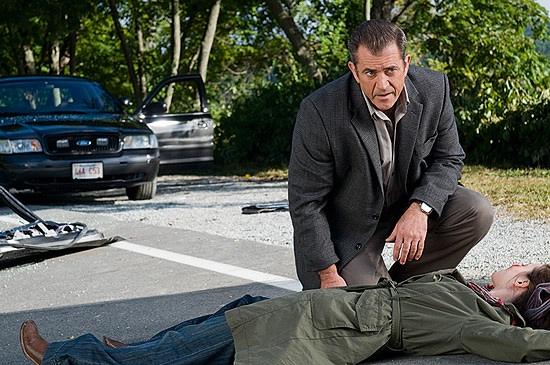Wed 3 Feb 2010
Darkness on the Edge of Town
Posted by Ethan under Film Review, NYC Film Critic
Comments Off on Darkness on the Edge of Town

Edge of Darkness
Directed by Martin Campbell
Starring Mel Gibson, Ray Winstone, Danny Huston
**
As much as I’d like to avoid turning my review of Edge of Darkness into a referendum on the state of Mel Gibson’s career, it’s impossible to discuss the movie without at least acknowledging the baggage its leading man brings with him.
It wasn’t always this way; once upon a time (specifically the ’80s and early ’90s) Gibson was the very model of a major movie star. Onscreen and off, he was charismatic and funny and managed to keep his private life out of the tabloids. It didn’t hurt that he mostly picked the right projects too–obviously Lethal Weapon is a modern classic (although the sequels sucked) and you’ve also got the Mad Max movies, The Year of Living Dangerously and his underappreciated version of Hamlet. Gibson’s charm also helped make movies that weren’t so great–like, say, Maverick and Air America–relatively painless to sit through.
But right around the time he won the Oscar for the absurdly overrated Braveheart, Gibson’s mojo started to falter. Starring roles in too many grim movies like Conspiracy Theory and Signs sapped him of his kooky sense of humor, arguably his greatest strength as an actor. Then along came a little movie called The Passion of the Christ, which exposed a side of Gibson he had previously kept under wraps. In the wake of that film’s phenomenal success, whatever demons he had been hiding seemed to take over his life completely, most notably in that ugly DUI arrest in 2006 when he spewed sexist and anti-Semitic insults at the offices that pulled him over. Since then, Gibson has essentially been in career exile and is just now taking his first tentative steps back into mainstream stardom.

On paper, Edge of Darkness must have sounded like a good career move. For one thing, it allows Gibson to once again don the mantle of the angry, revenge-seeking father, a role he previously took on in one of his biggest hits, Ransom. Secondly, it teams him up with director Martin Campbell, a skilled shooter of zippy, big-budget action movies like The Mask of Zorro. Interestingly, Campbell also directed the British miniseries the film is based on, which aired to great acclaim in England in the mid-’80s. That makes Edge of Darkness the second American remake of a British TV-series to arrive on screens in the past year, the other being 2008’s adaptation of State of Play, which I found to be a sturdy two-hour version of an exceptional six-hour story.
Unfortunately, I haven’t seen the original Edge of Darkness so I can’t tell you how the movie compares to its source material. All I can say is that I hope the miniseries lives up to its reputation, because the film version is a dud, devoid of any tension, suspense or good storytelling. The murky plot involves a Boston cop (Gibson) who welcomes home his grown daughter for a visit, only to see her gunned down on his porch by a masked assassin. The police department is operating under the assumption that Gibson was the intended target, but he’s not so sure, instead casting a suspicious eye in the direction of the corporation his daughter worked for. After doing some preliminary investigation (which primarily involves him beating up her boyfriend and glaring menacingly at her former boss, played by Danny Huston) he learns that the company was secretly manufacturing nuclear weapons to sell overseas. His daughter had stumbled upon this information as well and was planning on exposing the crime before she was murdered. Now it’s up to her dad to set this wrong right, although he’s far less interested in dragging the company through the mud than in seeing the men who run it buried six feet under.

This may sound like an odd thing to say given Campbell’s history with this project, but the fatal flaw of Edge of Darkness is a poor match-up of director and material. In the years since the miniseries aired, the filmmaker has gone on to do his best work as a hired hand aboard super-productions like the James Bond series (he helmed two of the best contemporary 007 installments, GoldenEye and Casino Royal), where he’s demonstrated a strong sense of pacing as well as a creative approach to action sequences. On the other hand, his turgid 2003 drama Beyond Borders showed that his skills didn’t necessarily translate across genres, a suspicion confirmed by Edge of Darkness. As written by William Monahan and Andrew Bovell, this is less of a slam-bang action movie and closer to the kind of slow, shadowy conspiracy tale that someone like Sydney Pollack or Alan Pakula might have directed the hell out of during the ’70s. Unfortunately, Campbell can’t seem to get a firm grasp on the script’s rhythms, resulting in a movie that’s plodding and aimless when it should be tense and taut. The director also strands that superb character actor Ray Winstone in a role that seems almost incidental to the main plot–one can only assume that his character’s storyline suffered the most in the translation from small-screen to big screen.
Even if Campbell had proven up to the task, it’s hard to say whether Edge of Darkness would have restored Gibson’s career in one fell swoop. It’s worth noting that the audience I saw the film with was vocally appreciative of his vigilante tactics, bursting into applause every time the actor shot a bad guy or talked trash to a corporate bigwig. For me though, Gibson’s avenging dad routine couldn’t begin to measure up to Liam Neeson’s ferocious interpretation of this same role in last year’s surprise box-office smash, Taken. He seems oddly distracted throughout, as if he’s concentrating so hard on maintaining his broad Boston accent that he can’t completely engage with the character or his co-stars. It’s clear that Gibson will never be the movie star he once was. The question before him now is, what kind of actor does he want to become?
Edge of Darkness is in theaters now.

No Responses to “ Darkness on the Edge of Town ”
Sorry, comments for this entry are closed at this time.